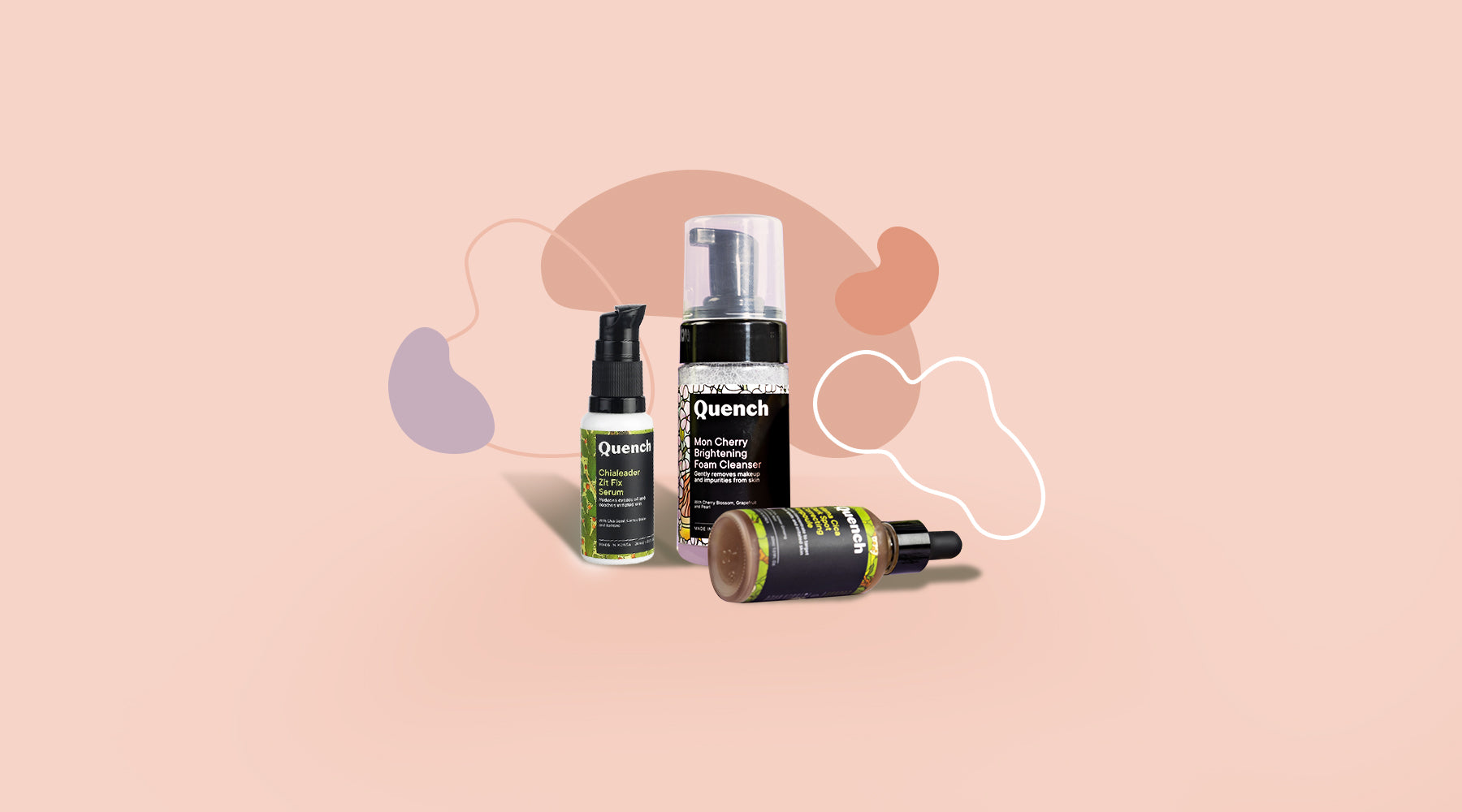
Skin Care Ingredients You Shouldn't Mix
Are you new to skincare? Or have decided to upgrade your skincare with more than just a simple cleanser and moisturizer. We all love to pamper our skin with the best of ingredients and products but some of them aren’t just meant to be together. It may be doing more harm than good to your skin.
Just like french fries and vanilla ice cream don’t go together, there are some ingredients in beauty that offer benefits to your skin individual but don’t work together. It can end up leading to some serious skin irritation or inactivating one another, neither of which you want. Based on your skin concern and type, it might be tricky to figure out which products are the best and you might even go through some trial-and-error. But don’t worry because we’re here to give you the whole lockdown on what skincare ingredients pairings you should avoid in your beauty regime. You can consider the below a helpful ‘cheat sheet’ of skincare ingredients that don’t work well together.

- Retinol and Vitamin C
If you thought that applying these two skin brightening ingredients will do double the magic for the skin, think again. Both Vitamin C and retinol tackle the same skin concerns like dark spots and fine lines but you can’t use them together. Vitamin C helps in reducing concerns like uneven skin tone, skin texture and acne scars. Whereas, retinol heals your cystic acne, lightens hyperpigmentation and softens your fine lines. But, not only do these increase skin irritation but also reduce the effectiveness of the products when layered together.
- Vitamin C and AHA/BHA
Alpha Hydroxy Acids (AHAs) and beta hydroxy acids (BHAs) are often used in chemical exfoliation products and are acidic— which means the pH level is higher. Vitamin C is formulated with a low pH level to ensure the effectiveness of the ingredient. And using AHAs or BHAs such as salicylic acid or glycolic acid together with vitamin C ends up disrupting the ideal skin’s pH level and causes peeling, discomfort, redness and irritation.
- Niacinamide and AHAs/BHAs
When used together it would have no effect but will cause redness. Niacinamide has around 5-7 pH value but when used with other ingredients it lowers the pH of the acids around 3-4. And when used separately, these ingredients help to improve the skin texture, signs of ageing and acne. Niacinamide works to keep your skin’s moisture barrier intact while promoting supple skin complexion. And when you mix it with AHAs or BHAs, niacinamide raises your skin’s pH level, making it less acidic and also lowering the concentration of both active ingredients used in the product.
- Retinol and AHAs/BHAs
Mixing retinol with AHA or BHA exfoliants can cause severe irritation to your skin. Exfoliating acids like glycolic acid, salicylic acid and lactic acid when used together with retinol hamper your skin’s pH balance. This combination altogether causes ingredient deactivation and doesn’t allow your skin to reap the benefits of the ingredients. These ingredients disrupt the skin barrier if you double them and ultimately leads to redness, rashes, irritation, excessive drying and sensitivity. The best way to use these together is by The easiest way to incorporate these ingredients in your routine is to use some products with acids in the day time like your exfoliating peel pads or facial toner enriched with an AHA, like glycolic acid, or BHA, such as salicylic acid. You can then follow this in the evening with a retinol product, this allows enough time to pass in between applications to avoid any irritation or imbalance of the skin’s pH levels.

- Salicylic Acid and Retinoids
Salicylic acid is used for treating acne and retinol for treating the early signs of ageing. Both of these ingredients when used together can dry out your skin and cause irritation. While both the ingredients work wonders for treating adult acne, the combined effect can be brutal for your skin (think of redness, flaking and dryness!). If you want to use both the ingredients, make sure to not apply them together. Salicylic acid can be used in your day care routine in the form of toner or a serum. Try Quench Chialeader Zit Fix Serum that features a unique blend of salicylic acid, cica and ceramide to sink into your skin effortlessly and work efficiently to control excess oil, breakouts, blackheads and bring back glow and skin firmness. Retinols can be used in your night time routine. For those with sensitive skin, we suggest switching to bakuchiol! A natural alternative to retinol, it's been found to have anti-inflammatory, antioxidant and blemish-clearing properties. To know more about this ingredient, checkout this article - Bakuchiol - The plant-based retinol alternative that will transform your skin!
- Two products with the same active ingredients
Even though we’re being redundant, it’s important to emphasize the fact that two skincare products with the same actives shouldn’t be combined. So if your serum has glycolic acid in it avoid eye cream with mandelic acid, as both are AHAs. Doubling up on actives can cause excessive discomfort and dryness. The pH level of both of the products will clash and only one of them will benefit your skin. And the pH level of the product that is more favourable to your skin will act and the other product might not. Honestly, there's no point in using them together. Make sure to use only one product and layer on a hydrating product like a gel-based moisturizer. The pH level of both the products (with same active ingredients) gets clashed and only one will act. And products that contain retinoids, alpha hydroxy acids (AHAs) and beta hydroxy acids (BHAs) shouldn’t be used together.

- Benzoyl Peroxide and Retinol
The primary reason that benzoyl peroxide and retinol shouldn't be used together is that they disable each other. Benzoyl peroxide is often prescribed for acne and even many dermats advise retinol to treat acne but they shouldn’t be applied together. Both of these products cancel each other and your skin will see spots and breakouts. You might also face other side effects such as redness, burning sensations and increased discoloration. Also, if your skin barrier feels compromised and you are experiencing irritation, use an active that works best for your skin so that a healthy skin barrier is maintained. In short, these ingredients (Retinol and Benzoyl Peroxide) when used together neutralize each other, thus making it less effective and increase the chance of irritation, redness.

That’s not even to say, you can’t use more than one line of product, but it’s just that you have to consider ingredients each skincare brand and product contains. And whether or not that ingredient combination could wreak havoc on the skin. As with any new ingredient or skincare product you integrate into your regime, one must be patient to witness the results. Allow your skin to adjust with the new ingredients before you oust them from your regime. Well, yes it can take weeks to several months for results to show. Our skin is unique in its own ways, so observe it and see how each of these ingredients work on your skin.




Leave a comment
This site is protected by hCaptcha and the hCaptcha Privacy Policy and Terms of Service apply.